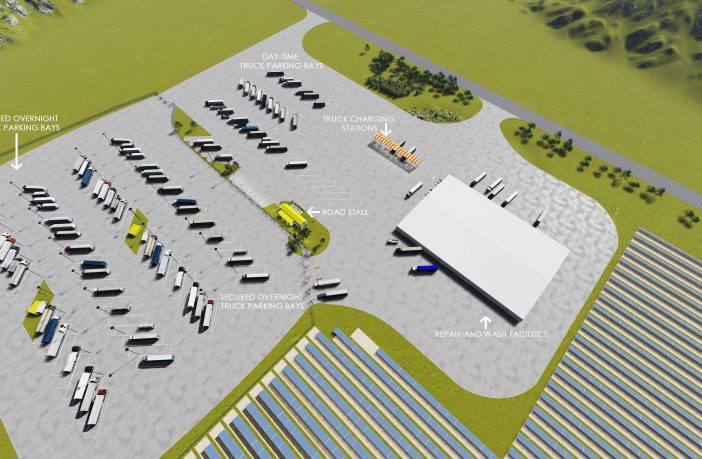- Zero Carbon Charge has announced the launch of its new subsidiary Zero Carbon Logistics, which will roll out 120 solar PV electric truck charging sites on national highways across South Africa.
- This will be the first off-grid, 100% green electric truck charging network in the country.
The initial 6 sites will be built on the major N3 freight route between Durban and Johannesburg (see locations below). This 120 truck charging network will be additional to the 120 electric passenger vehicle off-grid charging sites currently being built by Zero Carbon Charge.
This offering is in response to the growing shift by major truck manufacturers to producing electric truck models, with many truck manufacturers already committed to achieving full electric transition by 2040.
“The shift to electric trucks offers a major opportunity for South Africa to meet its Green Transport Strategy goal of reducing transport-related CO2 emissions by 5% by 2050”, said Joubert Roux, co-founder of Zero Carbon Charge.
“Every day, 8 756 trucks travel on the N3 between Durban and Johannesburg, using over 658 million litres of fuel at an import cost of R8 billion, emitting 1,781,256,762 kg of CO2 emissions per year. Replacing these fuel powered trucks with electric models will save 670 kg of CO2 emissions per truck per day, significantly reducing our country’s reliance on expensive dirty fossil fuel imports”, Roux added.
The growth in electric trucks will create an increased energy demand: the electricity required to charge the 8 756 trucks using the N3 route daily totalling an additional 2.3 billion kWh/year alone. If one takes into account all 14 national roads, the country would need an additional 8 billion kWh/year of electricity to power the 30 000 electric trucks travelling on these routes daily, placing a major strain on the national grid.
The charging stations will be completely off-grid, with each facility powered by 35 MWp of Solar PV, which means they will be able to continue servicing customers during loadshedding and will not contribute to greenhouse gas emissions. In light of Eskom’s electricity network being powered primarily by dirty coal for the foreseeable future, a major shift towards electric trucks poses the real risk of increased CO2 emissions. Zero Carbon Charge’s research shows that an electric truck charged by the Eskom network could emit 37.5% more CO2e emissions per kilometre compared to an equivalent diesel powered truck.
Each station will deploy ultra-fast charging technology coupled with modular battery packs that are being developed in China, with the goal of being able to charge a truck within 20 minutes. A big focus of the project is creating safe, clean facilities for truck drivers to rest, which in turn, will increase road safety. Each station will offer restrooms and a shop, fast WIFI as well as repair and wash facilities for trucks. There will be secured day and overnight truck parking bays available that will be monitored 24/7 by CCTV cameras linked to local security companies.
Author: Bryan Groenendaal















